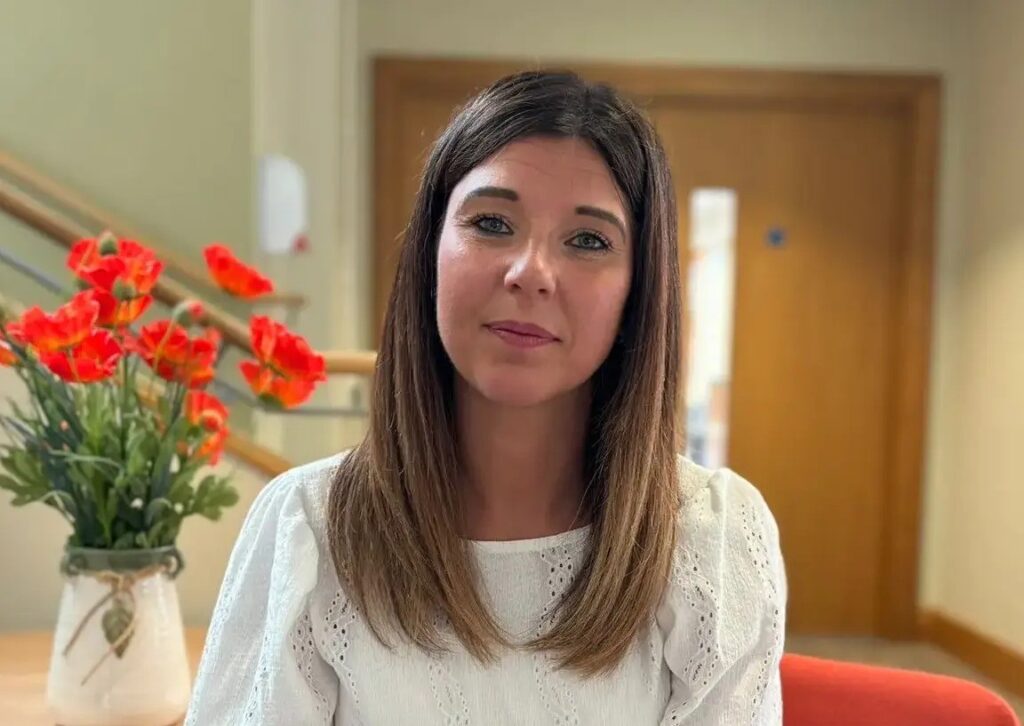St Giles Hospice has today (30th August 2024) announced that it is proposing to make significant redundancies as the hospice faces unsustainable rising costs and an urgent need to reduce its budget deficit – this currently sits at £1.5 million each year.
With the hospice sector facing a financial crisis nationally, St Giles Hospice, like many hospices, is facing a number of challenges. As well as a real terms reduction in income received from the NHS, the last few years have seen big increases in our costs, including the price paid for energy, food and clinical supplies. Our ability to raise voluntary income in the current financial climate has also been impacted as supporters struggle to cope with the cost-of-living crisis.
In 2022, as we approached our 40th anniversary year, we developed a new strategic plan with the aim of building resilience and continuing to provide specialist palliative and end of life care in a financially sustainable way.

The landscape in which hospices operate is evolving and St Giles needs to adapt to keep up with changes and challenges currently being faced in palliative and end of life care, whilst ensuring good financial management. To achieve this a review of the way in which we deliver our services, and the workforce required, has been critical.
Staffing costs form the majority of what we spend and ensuring we have the right workforce to deliver our services, in a cost-efficient way, is essential. We are therefore proposing to cut approximately 40 full-time roles – around 15% of our overall workforce.
As the gap between costs and income continues to increase significantly, we have held talks with NHS commissioners to negotiate additional funding. Conversations have taken place with the local Integrated Care Board (ICB) but, while they recognise the hospice’s value and the risks associated with a reduction in service levels, they also have a funding shortfall and are having to make savings themselves.
St Giles aims to support its community’s palliative and end of life care needs however it can, as well as support its colleagues in the NHS and wider health and care system. Financial pressures mean it must now focus on its very core specialist palliative care services.

Robin Vickers, Chair of the Board of Trustees, said: “Our teams support patients at end of life, and their families, both at our hospice sites in Lichfield and Sutton Coldfield and in their own homes. The prospect of having to make highly skilled, end of life healthcare professionals redundant, as well as their colleagues who run the charity, is incredibly difficult and is not a decision we are taking lightly. We are doing everything we can to support all our hospice colleagues through this difficult time.
“By making redundancies now, the hospice is ensuring it can return to a sustainable budget as soon as possible. As a charity, we are not underwritten by the government or the NHS, we cannot continue to run a deficit and simply run out of money; if we did, the hospice would cease to exist. St Giles has been supporting our local community for over 40 years and our intention is to be here to support those who need us most in another 40 years. The redundancy process we are going through is part of a wider transformation programme that puts the hospice on the right track to achieve this goal and continue to provide outstanding care in the years to come.
“St Giles has been working with Hospice UK and other hospices nationally to seek support to address the financial challenges across the sector. We have supported national campaigning and the debate on hospice funding in parliament; however, the government response was that funding decisions were a matter for local NHS commissioners (ICBs), and no additional money would be provided. We recognise that the local NHS and its social care partners are in a difficult position, with significant funding challenges themselves. We will continue to work positively with the NHS and other local partners but must also make the decisions required as an independent charity.”
Elinor Eustace, Interim CEO of St Giles Hospice, said: “There is a growing need for palliative and end of life care and the NHS is unable to meet the huge demands on its beds. Most people do not want to die in hospital and hospices provide outstanding services that support people to die in a place of their choosing.
“Whilst St Giles will continue to campaign for fair funding for hospices locally and nationally, in the absence of any additional support, we are not able to delay these difficult decisions any longer. The hospice has also looked to cut non-pay costs and invested in income generation opportunities but, although investing in fundraising and retail operations will help to give the hospice a long-term future, the return will not be at the rate of its rising costs.
“We recognise that this is a period of uncertainty for our workforce and the wellbeing of our staff, volunteers, patients, and families is paramount. Whilst this decision has been very difficult to make, the long-term future of St Giles is at its heart.
“We are incredibly grateful to everyone who helps to fund care for local people, and their loved ones, living with a terminal illness – whether that be from taking part in our events, supporting their local St Giles shop, playing our raffles and lottery or gifting their time – the support of our community is vital for our future.”
Toby Porter, CEO of Hospice UK, said: “We are devastated to hear of colleagues being made redundant at St Giles Hospice. These are brilliant staff, committed to supporting patients and families every day.
“St Giles is not the first, and sadly will likely not be the last. This news follows other redundancies and service reductions across the UK’s hospice sector.
“Let’s be clear: redundancies of health and social care staff are simply not acceptable given the huge pressures in our NHS and beyond. Hospices like St Giles are a critical part of our health and social care system. Service reductions only mean that more patients are channelled into overstretched NHS services. It’s counterproductive for St Giles to be forced into this position.
“As a hospice sector, we want to help the NHS. We want to do more. But as is clear from St Giles and elsewhere, that can only happen if hospices are given fair funding for the services they provide on behalf of the state. Let’s hope that more redundancies will alert the government to the need to act, quickly.”
St Giles Hospice remains fully committed to providing outstanding end of life care to local people, and their families, where and when they need it.
Frequently Asked Questions
With the hospice sector facing a financial crisis nationally, St Giles Hospice, like many hospices, is facing a number of challenges. As well as a real terms reduction in income received from the NHS, the last few years have seen big increases in our costs, including the price paid for energy, food and clinical supplies. Our ability to raise voluntary income in the current financial climate has also been impacted as supporters struggle to cope with the cost-of-living crisis.
Our Board and Executive Leadership Team (ELT) remain fully committed to achieving financial sustainability for our long-term future.
St Giles currently has an annual running cost of close to £10 million a year and, based on our planned budget for 2024/25, the NHS contribution equates to approximately 18% of our annual income. This means that as an organisation we face a £1.5 million deficit each year, which is unsustainable.
By making redundancies now, St Giles is ensuring we can return to a sustainable budget as soon as possible. As a charity, we are not underwritten by the government or the NHS, we cannot continue to run a deficit and simply run out of money; if we did, the hospice would cease to exist.
St Giles has been supporting our local community for over 40 years and our intention is to be here to support those who need us most in another 40 years. The redundancy process we are going through is part of a wider transformation programme that puts the hospice on the right track to achieve this goal and continue to provide outstanding care in the years to come.
The landscape in which hospices operate is evolving and St Giles needs to adapt to keep up with changes and challenges currently being faced in palliative and end of life care, whilst ensuring good financial management. To achieve this a review of the way in which we deliver our services, and the workforce required, has been critical.
As an organisation, 80% of our cost is on staff and associated salaries and therefore, it is paramount that we have the right workforce in place to deliver our services, in a cost-efficient way. The proposals that form the basis of the collective consultation could result in approximately 40 redundancies across St Giles, however this could change based on the consultation process.
This is a period of uncertainty for our workforce and the wellbeing of staff, volunteers, patients, and families is paramount. Whilst this decision has been very difficult to make, the long-term future of St Giles is at its heart, and we ask for your support as we navigate this challenging time.
St Giles is committed to continuing to deliver our care services at this difficult time and we recognise that our staff are working tirelessly to continue to deliver outstanding care for our patients, and their loved ones.
Our Board of Trustees and Executive Leadership team are fully committed to achieving financial sustainability, putting the patients, and loved ones, that St Giles serves at the heart of everything we do and every decision we make.
It is now critical for a sustainable future for St Giles that we focus on ensuring that we provide the right specialist palliative and end of life care for our community with the right workforce in place to meet their needs.
We are currently consulting with our workforce and, once we have further information to share about any specific changes to our service delivery, this will be communicated. At this time, the service delivery at St Giles remains unchanged.
St Giles is committed to continuing to deliver our care services at this difficult time and we recognise that our staff are working tirelessly to continue to deliver outstanding care for our patients, and their loved ones.
We are currently consulting with our workforce and, once we have further information to share about any specific changes to our service delivery, this will be communicated. At this time, the service delivery at St Giles remains unchanged and we are not in a position to confirm what changes may be made until the full consultation process has completed.
Our Board of Trustees and Executive Leadership team are fully committed to achieving financial sustainability, putting the patients, and loved ones, that St Giles serves at the heart of everything we do and every decision we make.
It is now critical for a sustainable future for St Giles that we focus on ensuring that we provide the right specialist palliative and end of life care for our community with the right workforce in place to meet their needs. Any changes to service provision will be communicated to staff and our external partners when we have concluded the consultation process with our workforce.
The landscape in which hospices operate is evolving and St Giles needs to adapt to keep up with changes and challenges currently being faced in palliative and end of life care, whilst ensuring good financial management. To achieve this a review of the way in which we deliver our services, and the workforce required, has been critical.
As an organisation, 80% of our cost is on staff and associated salaries and therefore, it is paramount that we have the right workforce in place to deliver our services, in a cost-efficient way. The proposals that form the basis of the collective consultation could result in approximately 40 redundancies across St Giles, however this could change based on the consultation process.
As an organisation we are currently consulting with our workforce, and we do not know an exact date that this will be formally concluded. Once we have further information to share about any specific changes to our service delivery, this will be communicated. At this time, the service delivery at St Giles remains unchanged.
Our budget deficit currently sits at £1.5 million each year, and this can only be reduced by a mixture of cost reduction and an increase in income generation.
Whilst St Giles will continue to campaign for fair funding for hospices locally and nationally, in the absence of any additional support, we are not able to delay these difficult decisions any longer. The hospice has also looked to cut non-pay costs and invested in income generation opportunities but, although investing in fundraising and retail operations will help to give the hospice a long-term future, the return will not be at the rate of our rising costs.
St Giles has been fortunate to have reserves, which have helped considerably in recent years. However, with an annual expenditure close to £10 million and a budget deficit of £1.5 million each year, we have an obligation to our donors and our existing and future patients, to remain responsive and cost-effective. We must therefore ensure that our reserves are not depleted below an appropriate level in order to continue to function.
St Giles is committed to continuing to deliver our care services at this difficult time and recognise that our staff are working tirelessly to continue to deliver outstanding care for our patients, and their loved ones.
Our Board of Trustees and Executive Leadership team are fully committed to achieving financial sustainability, putting the patients, and loved ones, that St Giles serves at the heart of everything we do and every decision we make.
It is now critical for a sustainable future for St Giles that we focus on ensuring that we provide the right specialist palliative and end of life care for our community with the right workforce in place to meet their needs.
In April 2023 we launched our three-year strategy for 2023-26. Year one was an enabling period in which significant work was undertaken on operational processes and procedures to ensure we have the right foundations in place to deliver our long-term goals.
St Giles has been working with Hospice UK and other hospices nationally to seek support to address the financial challenges across the sector. We have supported national campaigning and the debate on hospice funding in parliament and will continue to do so; however, the government response is that funding decisions were a matter for local NHS commissioners (ICBs), and no additional money would be provided. We recognise that the local NHS and its social care partners are in a difficult position, with significant funding challenges themselves. We will continue to work positively with the NHS and other local partners but must also make the decisions required as an independent charity.
Whilst St Giles will continue to campaign for fair funding for hospices locally and nationally, in the absence of any additional support, we are not able to delay these difficult decisions any longer. The hospice has also looked to significantly cut non-pay costs and invested in income generation opportunities but, although investing in fundraising and retail operations will help to give the hospice a long-term future, the return will not be at the rate of our rising costs.
St Giles has looked to significantly cut non-pay costs and invested in income generation opportunities but, although investing in fundraising and retail operations will help to give the hospice a long-term future, the return will not be at the rate of our rising costs.
Our budgeting process for 2024/25 implemented a cost improvement plan and identified significant opportunities to decrease our non-pay costs.
This plan focussed on making cost improvements and efficiencies on things that are within our control and so far, the cost improvement plan has seen a review of our contracts to ensure we’re receiving best value for money and that we take up any opportunities to renegotiate our rents and tariffs on things like our heating and lighting bills. This approach has already seen a reduction in our spend of around £300,000.
Whilst we have already made cost savings across the organisation through a cost improvement programme and the development of a robust procurement process, the majority of hospice expenditure is on staff and associated salaries.
Our vision at this time is that St Giles is a financially stable hospice and can deliver excellent care, with an outstanding team who meet the needs of our patients and their loved ones.
Reaching a financially sustainable position will enable a strong future for St Giles making us both one of the most resilient hospices in the sector and ensuring that we can deliver the best care possible for years to come.
With the hospice sector facing a financial crisis nationally, St Giles Hospice, like many hospices, is facing a number of challenges. As well as a real terms reduction in income received from the NHS, the last few years have seen big increases in our costs, including the price paid for energy, food and clinical supplies. Our ability to raise voluntary income in the current financial climate has also been impacted as supporters struggle to cope with the cost-of-living crisis.
In 2022, as St Giles approached our 40th anniversary year, we developed a new strategic plan with the aim of building resilience and continuing to provide specialist palliative and end of life care in a financially sustainable way. Now, into year two of this strategic plan, St Giles has an urgent need to reduce our budget deficit – this currently sits at £1.5 million each year.
By making redundancies now, St Giles is ensuring we can return to a sustainable budget as soon as possible. As a charity, we are not underwritten by the government or the NHS, we cannot continue to run a deficit and simply run out of money; if we did, the hospice would cease to exist. St Giles has been supporting our local community for over 40 years and our intention is to be here to support those who need us most in another 40 years. The redundancy process we are going through is part of a wider transformation programme that puts the hospice on the right track to achieve this goal and continue to provide outstanding care in the years to come.
This situation is not unique to St Giles. Hospice UK, the national champion for hospices representing more than 200 hospices across the UK, believe that around a fifth of hospices nationally are reviewing their workforce design. This includes Birmingham Hospice who recently announced proposals to make redundancies. We are aware of reports that other hospices are predicting redundancies, with some having already started their own review and consultations with staff.
To achieve our long-term financial sustainability, we have three main priorities:
- Supporting our objective to increase our income, both voluntary and statutory.
- Identifying areas for improvement in operational effectiveness and efficiency.
- Striving to identify opportunities for decreasing our costs.
Increasing our income, both voluntary and statutory, has always been a priority for St Giles.
When we launched our new three-year strategy in April 2023, one of our six strategic objectives was to grow our income. Under this objective we aim to maximise our income generating activities to secure a sustainable future.
Our chain of charity shops is a vital source of income for St Giles and we’re investing in our shops through a refurbishment programme to help us raise more funds for the patients and loved ones we support.
An average of between £600,000-£800,000 is raised through our charity shops each year and we are grateful to everyone who donates to and shops in our stores.
The shops refurbishment programme does not take funds away from our vital services and is part of the wider strategy to increase income for the care that St Giles provides.
We remain committed to increasing our income generating activities in order to achieve long-term financial sustainability for St Giles Hospice.
To achieve our long-term financial sustainability, we have three main priorities:
- Supporting our objective to increase our income, both voluntary and statutory.
- Identifying areas for improvement in operational effectiveness and efficiency.
- Striving to identify opportunities for decreasing our costs.
Increasing our income, both voluntary and statutory, has always been a priority for St Giles.
When we launched our new three-year strategy in April 2023, one of our six strategic objectives was to grow our income. Under this objective we aim to maximise our income generating activities to secure a sustainable future.
The March of The Elephants programme relied heavily on sponsorship from our local corporate community in order for the project to go ahead. We have garnered huge support from our corporate sponsors to host this project and have so far received sponsorship or ‘gift in kind’ support estimated to be worth over £200,000 to fund this exciting venture.
In autumn 2024, all large elephant sculptures will be auctioned off to raise money to directly fund our hospice care services.
The March of the Elephants programme does not take funds away from our vital services and is part of the wider strategy to increase income for the care that St Giles provides.
We remain committed to increasing our income generating activities in order to achieve long-term financial sustainability.
Make a donation:
- Text STGILES to 70450 to donate £5 T&Cs
- Make a one-off or regular donation online
Support March of the Elephants:
Following a ten-week art sculpture trail around Lichfield, Tamworth and Sutton Coldfield, we will be auctioning our beautiful elephant sculptures at Lichfield Cathedral on Tuesday 24th September. All money raised at auction will support St Giles Hospice. Register your interest to attend here: Auction – March Of The Elephants
Write to your local MP:
Hospice UK is running a ‘write to your MP’ campaign to ensure every MP hears about hospice care and why it matters. We’re supporting this incredibly important campaign and we’re calling on our local community to get behind it too.
Please write to your MP today, so that the government understands the scale of the challenge facing hospices. There’s a simple online template from Hospice UK, that’ll take just 30 seconds of your time to fill in, and will automatically identify and contact your local MP once you’ve entered your home address: Write to your MP today to tell them about the UK hospice funding crisis | Hospice UK

